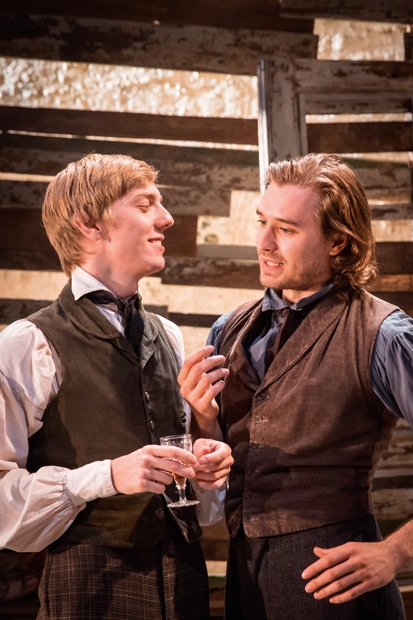Fans of Chekhov have to endure both feast and famine. Feast because his works are revived everywhere. Famine because he concentrated all his riches in just four great plays that grow stale with repetition. For fresh nourishment we turn to Brian Friel, whose stage adaptations of the short stories go some way to appease our hunger. In 1987, Friel applied his skills to Fathers and Sons, by Turgenev, which is now revived at the Donmar.
The magical charm of a Russian estate is superbly conjured by Rob Howell’s set. Slatted timbers and peeling paintwork. Golden shafts of sunlight falling on crimson rugs and scattered wicker baskets. The story concerns two chums, Arkady, a philosophy graduate, and Bazarov, the star of the university who has won every prize available and has become the anointed leader of a dangerous revolutionary group, the Nihilists. Arkady invites Bazarov to spend the summer with his family and an emotional earthquake follows.
Unexpected romances pull the pals in different directions. Their harsh and unfeeling philosophy takes a bit of a kicking as well. Arkady melts into the arms of a prim little bourgeois madam while Bazarov tries to uphold his austere principles while seducing Anna, an icy millionairess. Turgenev’s world outlook is far less whimsical than Chekhov’s, and a lot more politically astute. Bazarov is in deadly earnest when he calls for the destruction of everything in Russia and the creation of a new society so radical that even words will have new meanings. This great speech has a wonderful dramatic duality. First, there’s Bazarov’s immediate purpose (concealed even from himself), which is to dazzle Anna with his butch and potent rhetoric. Secondly, there’s the Stalinist subtext, which chills the blood of today’s spectators because we know that these fanciful theories, elaborated by idealists on dreamy summer lawns, can lead to decades of war, and to mountains of corpses. This is irony in its true sense: the ‘blindness’ of a character who lacks the foreknowledge of his observers.
There are so many virtues in this show that it’s hard to know where to start. Anna is played with cool and watchful detachment by the lovely Elaine Cassidy. Joshua James, as Arkady, is a striking newcomer. With his large, widely spaced eyes, and his lanky stoop, he has an Audenesque air of distracted romanticism. He’s quite a find. Barely out of drama school, and he takes the second lead without a creak or a false note.
There’s amusing work from Susan Engel as Princess Olga, a violent elderly curmudgeon, who snores beneath a parasol all afternoon. Occasionally, she stirs herself awake to deliver a barmy epigram. The best way to train an unbroken horse, she suggests, is to clobber it repeatedly on the skull with a crowbar. Asked to name her favourite month she says, ‘I hate every month. For different reasons.’
Bazarov is played by Seth Numrich, a handsome nuisance, who at first seems far too preoccupied with his mop of greasy hair. He keeps scooping and flipping it backwards like a chef absorbed with his favourite stir-fry. But his sneering, waspish performance is a deliberate piece of misdirection that makes his learning curve, and his shocked discovery of his human self, all the more powerful.
Even actors I don’t greatly appreciate had me sighing with approbation in this show. Anthony Calf, who specialises in earnest duds, delivers a dexterous and subtle performance as Nikolai, the shambolic landowner racked with guilt after impregnating his serving girl. Calf’s adroit comic touch is a revelation. Tim McMullan, often cast as a pretentious lightweight, begins with his usual wobble and lisp. He plays a poncy intellectual, Uncle Pavel, a multilingual misfit who wears English suits, buys silly Scottish novels and boasts non-stop about his friendship with the Duke of Wellington. But this mincing name-dropper has true mettle in his soul and he moves very gradually from the fringes of the play to occupy its moral centre. When Bazarov insults the wrong woman, Uncle Pavel challenges the young pup to a duel. Their dawn meeting, with pistols, seems like the climax of the story but this is another cunning distraction and the real crisis (again superbly camouflaged) falls like a bolt of lightning from nowhere.
Friel has brilliantly reshaped the novel’s ending and even those who’ve read the original will be gripped and devastated by the harrowing final scenes. This is one of those rare shows that make me envious of play goers who haven’t yet experienced its humour, its horror and its beauty. The director, Lyndsey Turner, was responsible for the outstanding West End play of last year. That was Chimerica. She’s done it again.







Comments